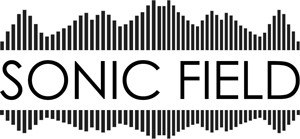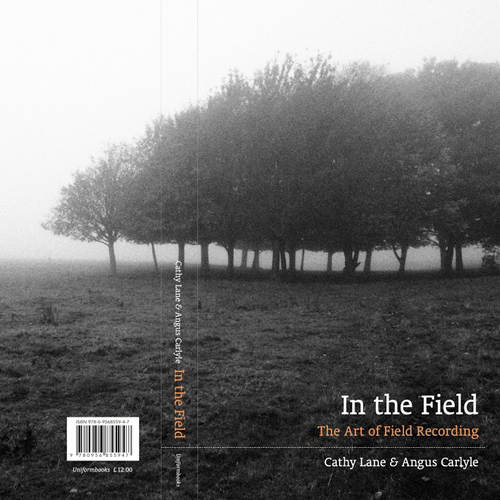In the field. The Art of Field Recording.
CATHY LANE, ANGUS CARLYLE
(Uniformbooks 2013)
Review by Patrick Farmer
“A place is what it is because of its location. Where we are is who we are”
-Alvaro De Campos
If I were to try and comment on all the points raised in this anthology of interviews – positions therein, concerning “contemporary sound artists who use field recording in their work”, it would take as many pages as the publication itself. So I shall just briefly touch on a few of what I consider to be, the more pertinent points, responding to the questions and answers contained in its pages with yet more questions, like a series of parts without a whole. What I mean by this is, herein I shall attempt a reflected sense of a jarred multiplicity. If the reader senses reflection he or she is asked to consider that my words are simply gazing back at the words that caused them to exist in the first place.
From the very first page the grounds of the book are read out loud:
“This book provides evidence for the sense that these technical and creative developments need always to be considered in the context of a conceptual or philosophical frame”
Followed by and following:
“For field recording, how the field is defined is at least as important as how the recording is itself has been accepted” (sic)
The inevitable reduction / the unmarked representation.
For a book that claims its purpose is to provide “evidence for the sense that technical and creative developments need always to be considered in the context of a conceptual or philosophical frame” there is an apparent lack of self-critique, and of separation. This observation, from its outset, stems from the lack of diversity and uninvolved questions put forward, I can’t reason why such an approach was considered in the first place. Anything that attempts to borrow from the omni-experience of field recording, as it is laid out here, and attempts to portray this embrace, through written language, will always arouse suspicion, as many of these experiences exist, outside of language, written or spoken. But what does this mean? That the language of listening need be different from the existence of audition? Perhaps we should concentrate on the dissimilarities… Perhaps instead of always looking back at Ludwig Koch, the mythos of his adolescent passerine, creating a comfortable backdrop of nature from which to project, we might consider that the present is a plane where we are able to listen to that which is not implicit and sounding, to consider that every word, or every anecdote, is as varied, loud, or as quiet as the next. Sound is unspoken in all that is spoken, and here I would proffer the advise of Basil Bunting, (being as I am not here considering electronic field recordings, rather the textual recollection and conceptual etching of such experience) the poet of Briggflatts, in his suggestion that we: “fear adjectives, they bleed nouns.” Sound has never needed us to speak for it.
It’s the reductive element of language, of inquiry, not necessarily response, that I feel needs consideration here. It’s as if hundreds of years of literary history (and here I am not only referring to the in the field publication, but field recording, in whatever guise it chooses to exist) never occurred. The San Francisco poet, Jack Spicer, once said that, and here I am paraphrasing -poets should read everything they can, as much they can that is seemingly unrelated, that poems can not live alone -we need ask everything we can, otherwise we find ourselves in an analogous position to those expert ears that permeate the pages of in the field, serving to cut an environment into pieces, guided by the constant warble of overt audible catechising… But do we concentrate on the ever forming semantics or the content therein? The repetition of the questions or the responses that follow? With text there is no need to deal with sound implicitly, in terms of bang crash and wallop; words will always be permeated with sound, leaving no need to dress sound with sound.
In nadja, Andre Breton tells of the constant encounter, the lasting loves portrayed, through extra-literary preoccupations, anecdotes, personal documents, the chance and divergence that instil in him a “supreme sense of proportion.”
“(Victor) Hugo, toward the end of his life, took the same ride with Juliette Drouet every day, always interrupting his wordless meditation when their carriage passed an estate with two gates, one large, one small; pointing to the large gate, Hugo, for perhaps the thousandth time, would say: “Bridle gate Madame,” to which Juliette, pointing to the small gate, would reply: “Pedestrian gate, Monsieur”; then, a little farther on, passing two trees with intertwining branches, Hugo would remark: “Philemon and Baucis,” knowing that Juliette would not answer; we have reason to believe that this marvellous, poignant ritual was repeated daily for years on end; yet how could the best possible study of Hugo’s work give us comparable awareness, the astonishing sense of what he was, of what he is?”
To finish this review before it begins I will say right away that such, a turning of the head, a looking or listening elsewhere, is missing from all over this book, the ability, or the desire, to talk about relationships in sound without talking about sound about sound about sound. Implicit in all language is vibration, in all things, bridges, cotton, yellow, connection. Nothing vibrates in and toward itself, as we perceive it, yet I feel the content of this book is very much a literary equivalent to a particularly anthropic impossibility of a singularity. But that’s just it. Implicit, and assumed. As I read through Breton’s initial anecdote, setting the scene, I think of how he relates the tale to love, yes! How can we do this, and I do not mean, how can we seek to emulate, but how can we listen to something other than sand without getting it in our mouths. Elsewhere in the book he speaks of the painter, Giorgio De Chirico, announcing that nothing can be said of him before: “…we have taken into account his most personal views about the artichoke, the glove, the cookie, or the spool.” I’m not saying we need adapt, fix ourselves into the selves of others preponderance, not at all, rather that this speaks volumes, and that we should, ironically, listen. There is surely more to the ear than the ear itself. What would this even mean for listening? Surely the ear does not end with listening? Surely listening does not end… So why do we coddle it so? This book, as it is, a specialist trope, makes me wonder and wonder and wander, from whom is it we are trying to wrestle back audition? Is anyone hoarding it but us?
My experience whilst reading in the field is in no way comparable, and neither should it be, to listening to the works of the individuals involved. But again, here is the point, arrived at once more, commented upon once again, why should this anthology seek to emulate the field, the appendage, it stems from but can easily survive without? The assertion that listening only concerns listening, that it only refers to that which is heard or felt, is as reductive as assuming that love is only concerned with love, that it borders only as an image of itself.
To repeat. There are so few references outside of direct auditory experience and as such it leaves me coldly considering whether this book and its always potential of multiplicity, something that evidently exist outside of the book itself in those questioned, is not even more reductive than a field recording? Imagine, between the twenty people involved, how many, shall we say, environments (the earth, the world), are attached and always attaching in a variety of encounters between imagination and the realities that frame themselves all over degrees of laterality and symmetry. I can’t help but pine for the depth of narrative, the wealth and abundance of spores, grown from individual practices. Why, even in a book concerned with a practise enmeshed in an already always enmeshing audition, would an artefact that need not lend itself to any one particular consciousness and train of experience? wWhy would it try so hard to then reduce itself and all concerned to a singularity?
I am reminded that field can indeed dissolve into field, a field, quite literally, is not only about agriculture, just as a field is not just about the ear. And what is the ear actually about anyway? Or field? We all know that we perceive the earth with the entirety of our bodies, that the ear stretches for miles and miles. Perhaps we should investigate further threads within dialectics of, for example, the digression and stasis of the ear, the written ear, the latent auricular, the gesture of Francesco Maria Grimaldi as he plugged appendage, immanently greeted by the infinite well of the intramural, Kafka’s mole, the invisible ear, the recorded ear, Guillame Apollinaire’s extreme disparity of structure, Thomas Browne’s mandrake and clouds, I could go on, and I’m not saying this is all there is, but considering the unique place from which such a book arose, I would have liked to have at least experienced a modicum of totality.
Why are we still talking about listening as if for the first time it were being given its due? The phenomena, the content of the ear, is everywhere, seemingly doomed to try and learn what we should simply recognise In all this listening we seem to have forgotten that we’ve been listening all along. We cant any of us be aware of all the developments occurring in all these vast and interdependent fields, but what is remarkable about this book, for me, is that it doesn’t really touch upon anything contemporary when discussing relationships of the world and its representations, but as I stated earlier, I would ask the reader to sense a rumpus borne of the questions of the book, and not primarily the answers, as providing impetus around and around my words. The empty ear struck from within, roaring.
In the field had to happen, but I hope we can begin to stop talking about and considering listening as something exclusive to the distinction of field recording, and, if we are going to talk about it, which I am happy we are, begin to consider that we’ve always been listening, and that the preponderance of attention paid to it as a quasi-eccentricity is not a contemporary notion bar the inevitable nuances that make it so, the distinction, I might add, that enables us to reduce through magnification. Please do read this book.
[Cathy Lane, Angus Carlyle]
Cathy Lane website
Angus Carlyle website
Uniformbooks website



